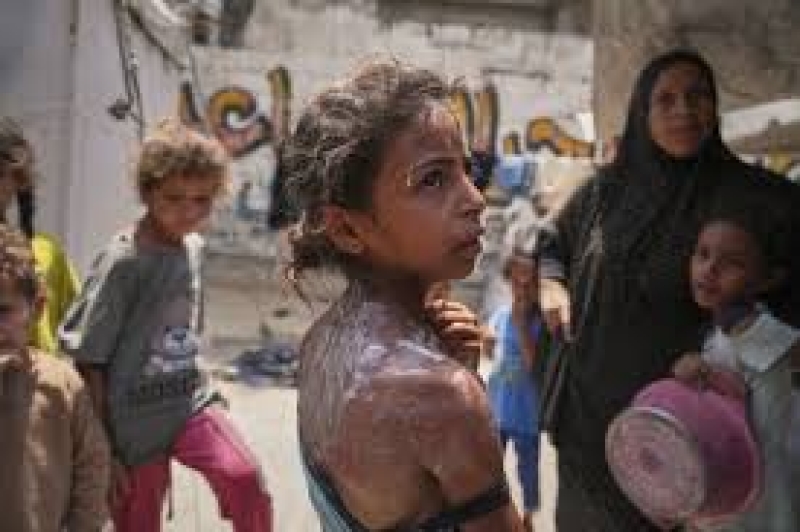- India Sees 9% Drop in Foreign Tourists as Bangladesh Visits Plunge |
- Dhaka Urges Restraint in Pakistan-Afghan War |
- Guterres Urges Action on Safe Migration Pact |
- OpenAI Raises $110B in Amazon-Led Funding |
- Puppet show enchants Children as Boi Mela comes alive on day 2 |
36 Palestinians killed seeking aid in Gaza: officials

At least 36 Palestinians were killed and over 200 injured on Tuesday as they attempted to reach desperately needed aid in Gaza, according to the Palestinian Health Ministry.
Humanitarian workers and analysts warn that the ongoing Israeli blockade and nearly 20 months of military operations have pushed Gaza to the edge of famine. Aid distribution points, many located in areas designated as military zones and inaccessible to independent journalists, have seen a series of deadly incidents.
So far, at least 163 people have been killed and nearly 1,500 injured near sites managed by the Gaza Humanitarian Foundation, which is backed by Israel and the U.S. While the Israeli military has admitted to firing warning shots at people it deems suspicious, the foundation claims that violence has not occurred at the actual aid delivery points. It has, however, urged civilians to stay on designated access routes and temporarily suspended operations last week to negotiate safety improvements with the military.
Escalating Death Toll at Aid Sites
In Rafah, southern Gaza, Nasser Hospital reported the deaths of at least eight people attempting to access aid. Meanwhile, in the north, al-Awda Hospital stated that two men and a child were killed, and over 130 others were wounded, mostly by gunfire. Witnesses told the AP that Israeli forces opened fire around 2 a.m., hundreds of meters away from an aid site in central Gaza.
Crowds often gather long before sunrise in hopes of securing food. The Israeli military confirmed it had fired warning shots at individuals it labeled as suspects approaching its forces before the aid site opened.
One local resident, Mohammed Abu Hussein, said drones and tanks fired live rounds, and he personally witnessed several people getting shot. Another witness, Abed Haniyah, claimed Israeli forces fired “indiscriminately” at thousands trying to access food.
“People are being killed just for trying to feed their families,” Haniyah said. “It’s humiliating — every day brings more deaths.”
In a separate incident, three Palestinian emergency medics were killed Tuesday when an Israeli airstrike hit a building in Gaza City’s Jaffa Street. The Health Ministry said the medics were responding to an earlier strike on the same building when a second attack occurred. The Israeli military did not comment specifically on the incident but said it had targeted dozens of Hamas-related sites in the past 24 hours.
U.N. Rejects Israel-U.S. Aid System
The current aid distribution system, set up by Israel and supported by the U.S., aims to prevent Hamas from intercepting humanitarian supplies. However, the United Nations and major humanitarian organizations have refused to cooperate with it, arguing that it breaches international humanitarian norms by allowing Israel to control who receives aid and forcing Palestinians to travel to only three operating hubs.
Two of these hubs are located in Rafah, which has been largely cleared of civilians and converted into a military zone. Israeli forces surround all three distribution points, requiring civilians to pass through highly controlled areas to access assistance.
Prime Minister Benjamin Netanyahu has proposed establishing a "sterile zone" in Rafah, free from Hamas, and has floated the idea of voluntary relocation of Gaza’s population — plans condemned by international bodies as a form of forced displacement.
War's Toll on Gaza
The ongoing war began with Hamas’ October 7, 2023, assault on southern Israel, which left around 1,200 Israelis dead and 251 taken hostage. As of now, 55 hostages remain in Gaza, though less than half are believed to be alive. Most of the others were released during ceasefires or through other agreements.
In response, Israel launched a massive military campaign that Gaza’s Health Ministry says has killed nearly 55,000 people — primarily women and children. Israel claims over 20,000 of the dead were militants but has not released evidence to support this.
Much of Gaza has been reduced to rubble, and about 90% of its population has been displaced, many of them multiple times.
Despite growing international pressure, prospects for a ceasefire remain uncertain. Netanyahu said on Tuesday there was "meaningful progress" in negotiations to halt the fighting and recover hostages, but cautioned that it’s still "too early to hope." Foreign Minister Gideon Saar echoed similar sentiments, reports UNB.

